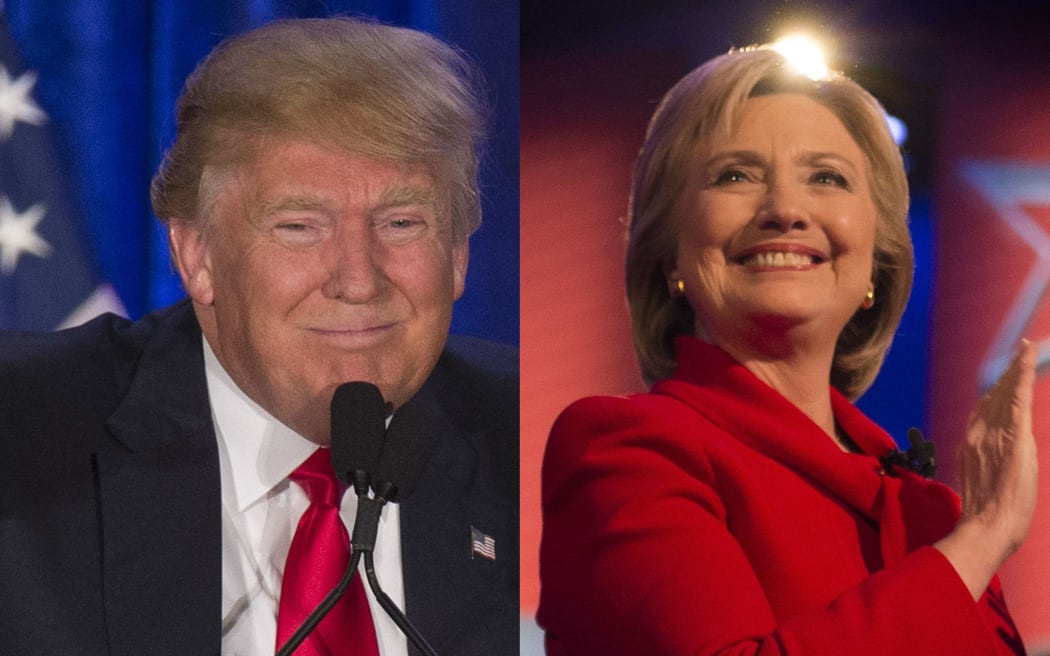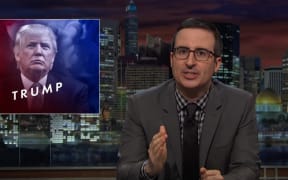ANALYSIS: So we're roughly 15 states down and 35 to go. Having fun yet?
Super Tuesday (Wednesday in New Zealand) saw 11 states voting on the biggest single day ahead of the presidential election on 8 November, with Hillary Clinton and Donald Trump winning a majority of them.

Donald Trump and Hillary Clinton won a majority of the states that voted yesterday. Photo: AFP
The super basics
Mr Trump won seven of the 11 Republican state contests, with a top vote of 49 percent, and gained around 250 delegates.
It's easier to win a field split five ways. He has a quarter of the delegates he needs to be the nominee. Importantly, he did well everywhere - even when he didn't win - while everyone else had only niche success.
Ms Clinton won seven of the 11 Democratic state contests with a top vote of 78 percent, and gained 588 delegates.
She is already nearly halfway to the delegates she needs to be the nominee - with 35 states yet to go.
In many places, she won two thirds of women, 60 percent of Latino voters and overwhelming numbers of black voters. That's hard to beat.
The other candidates
Senator Bernie Sanders had a good night and a huge win in his home state of Vermont but is quickly falling behind Ms Clinton in delegates, and running out of liberal states to peel off.
When he wins a state, he doesn't gain many extra delegates, whereas Ms Clinton has trounced him repeatedly in big states.
He has the war chest to stay fighting, and says he will, but at this point has no feasible way of winning that doesn't involve a miracle. Ms Clinton now has to try to find ways to let him and his supporters down gently to gain their support in November.
Marco Rubio, last week's great white hope of the Republican anti-Trumps, crashed and burned badly. He finally won a state (Minnesota - the state that chose a WWF wrestler as governor), but missed the 20 percent cut-off required to win any delegates at all in Texas, Alabama and Vermont.
He's now fallen well behind Ted Cruz in delegates and polls show him losing his home state, Florida, to the Donald in a winner-takes-all contest on 15 March. That would finish him off.
Mr Cruz had a good night, picking up three states including his own one, the delegate-rich Texas. But the places the senator wins are all ultra-conservative and he only has one home state (sorry, Canada). So he seems unlikely to suddenly overtake Mr Trump.
Still, Mr Rubio did so badly that the establishment might suddenly switch back to Mr Cruz as their saviour. They'll just have to hold their noses slightly tighter when they vote. South Carolina senator Lindsay Graham said: "We may be in a position where we have to rally round Ted Cruz", which doesn't sound at all desperate.
John Kasich did better than many expected and may hold on until his home state, Ohio, but coming second twice in 15 contests is hardly building confidence. Maybe he hopes he'll be the remaining moderate at a brokered convention. One commentator noted that he does so well in New England he'd be a contender for the 1796 election.
The take-aways
Step away from the tiara. Donald Trump (or is it Drumpf) hasn't been crowned emperor quite yet despite media emotion and general amazement at his success thus far.
And, for those terrified by the prospect of him in the general election, keep in mind that one of the reasons Republican Party honchos are horrified by his success is that they believe he would get trounced by Ms Clinton in November. Of course, the fact he's untameable doesn't thrill them either.
Hillary Clinton is so clearly going to win (nearly halfway to 50 percent of delegates with only 15 states gone) that Mr Trump declared her the de facto Democratic candidate in his victory speech.
Her close connection with President Barack Obama helped Ms Clinton solidify the black vote to her enormous advantage but it also lost her Oklahoma, where Mr Obama has never been popular. It's the state he failed to win a single county in when elected president.
Ted Cruz is still not a serious contender. He has aimed his whole campaign at the religious right but still managed to pick up only 40 percent of evangelicals in his home state, Texas.
The Republican Party might be reaping their own result. Exit polls show Republican anger and a strong desire for a political outsider. For a long time, the party has enthused voters by promising 'red meat' to the base on issues like abortion, immigrants, and school prayer but once elected these things get forgotten in favour of corporate tax cuts.
Now, a good portion of that conservative electorate has lost faith with their own party - and the more the party bosses oppose Mr Trump, the more he's their man.
Donald Trump was introduced at his victory speech press conference by New Jersey governor Chris Christie, who then stood behind the billionaire as he gave a rambling interminable speech.
Twitter lit up with pictures of an apparently pained, bored governor who is not used to standing still as a stage prop. You could also see the self-respect draining away.
Meanwhile, a New Hampshire newspaper has apologised for endorsing him.
Exit polls suggest that Republicans attempts over the last few years to tar Ms Clinton over email servers and Libyan attacks have been successful in leaving an impression, even among Democrats, that she is dishonest.
While liability is the most powerful candidate trait, honesty is also a strong motivator. Still, faced in the general election by Mr Trump, Ms Clinton would surely win this point.
Ben Carson is finally dropping out although yesterday he said he'd stay in and prayer would take care of everything.
Republican strategist Rick Wilson said that for Mr Carson to have a chance "a meteor has to kill Trump, Cruz and Rubio, and John Kasich has to get mauled by a wolverine".
Maybe that's exactly what he was praying for but God said no.







